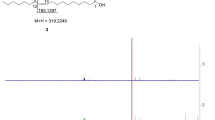Abstract
EXPERIMENTS carried out in this laboratory1 have shown that 1:2:5:6-dibenzanthracene and 5:6-cyclo-penteno-1:2-benzanthracene are the most carcinogenic of pure compounds yet described. The action of these compounds and of certain non-carcinogenic hydrocarbons on the oxidising enzymes of yeast and muscle has been studied. The carcinogenic and other hydrocarbons dissolved in benzene or toluene were shaken up with enzyme preparations, and the effect on the activity of the enzyme measured. In no case was indophenol oxidase of yeast or muscle affected by any such treatment.
This is a preview of subscription content, access via your institution
Access options
Subscribe to this journal
Receive 51 print issues and online access
$199.00 per year
only $3.90 per issue
Buy this article
- Purchase on Springer Link
- Instant access to full article PDF
Prices may be subject to local taxes which are calculated during checkout
Similar content being viewed by others
References
The Production of Cancer by Pure Hydrocarbons, (Pt. 1) by J. W. Cook, I. Hieger, E. L. Kennaway, and W. V. Mayneord, (Pt. 2) by J. W. Cook, Proc. Roy. Soc., B (in the press).
J. W. Cook Unpublished results.
Biochem. J., 22, 689; 1928.
Author information
Authors and Affiliations
Rights and permissions
About this article
Cite this article
BOYLAND, E. Inhibition of Enzymes by Carcinogenic Compounds. Nature 130, 274–275 (1932). https://doi.org/10.1038/130274b0
Issue Date:
DOI: https://doi.org/10.1038/130274b0
This article is cited by
-
Photo-oxides of Carcinogenic Hydrocarbons
Nature (1939)
-
Malignant growth in relation to enzyme activity
Protoplasma (1935)
Comments
By submitting a comment you agree to abide by our Terms and Community Guidelines. If you find something abusive or that does not comply with our terms or guidelines please flag it as inappropriate.



